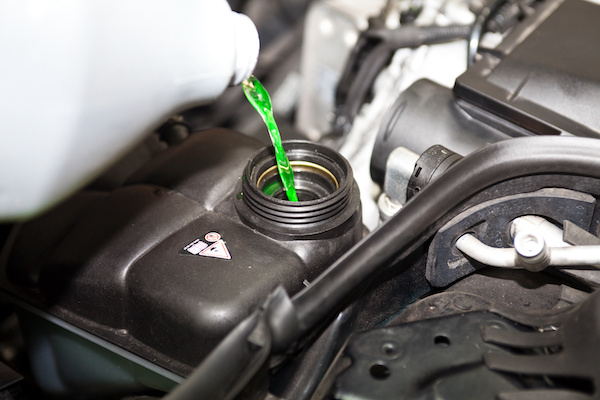Posted on 4/27/2022

Vibrations felt through a vehicle's brake pedal or steering wheel when you're braking are known as brake shudders. Brake shudders can be mild to violent. Identifying the vibration source can help you know if the problem is with the front or rear brakes. If you feel the vibrations through the steering wheel, the issue could be with the front brakes. Stronger vibrations on the brake pedal indicate a problem with the rear braking components. Below are some reasons why your car may experience brake shudders. Alignment Issues Brake shudders occurring when you're braking at over 50 miles per hour may be due to alignment problems. You can perform a road test with your vehicle when there are no others on the road to prove this theory. To do this, maintain a speed of 50 to 55 miles. When the coast is ... read more
Posted on 3/28/2022
.jpeg)
If you've been a driver for decades, you've probably owned quite a few cars in your lifetime. Back in the day, a tune-up was a straightforward service that was needed for cars still using a carburetor. Nowadays, vehicles no longer have carburetors, yet the term tune-up is still prevalent. So, what does it mean in today's terms? While the definition of a tune-up has changed over the years, it still loosely refers to vehicle maintenance or sprucing up your vehicle. The original term "tune-up" was actually coined by Henry Ford while he was still working on his first automobile prototype. In order vehicles, there was a separate ignition coil for every spark plug. When the coils sparked, they would make a humming or buzzing noise. Over time, they would get "out of tune", and would need a mechanic to properly adjust them so that they would be in tune again, hence the term "tune-up" was born! While this service requirement has changed, many still us ... read more
Posted on 2/25/2022
.jpeg)
If you're having issues steering your car, it is most likely tied to your car's power steering system. The steering wheel may feel stiff, hard to turn, or even sticky. To uncover what that could mean, let's take a look at three popular power steering issues in vehicles. Low Power Steering Fluid Low power steering fluid is one of the most popular problems for hydraulic power steering systems. Over time, your car will need a power steering fluid change to ensure all its components run smoothly. During this service, your technician will also check for signs of leaks. If this fluid is dirty or low, your steering will be compromised and be slow. You may also catch random squeaks when turning the car. First, you should check underneath your vehicle for any leaks. Otherwise, a professional mechanic can look at the inner workings of your power steering system and identify a leak if there is one present. Faulty Steering Rack Mount Most cars today use a "rack-and-pin ... read more
Posted on 1/11/2022

A coolant flush can preserve your vehicle's health and regulate your engine's internal temperature. Flushing your cooling system from its impurities can decrease wear and tear over time. A coolant flush includes the process of getting rid of the old coolant from the radiator and replacing it with new fluid. Doing so will ensure that your engine's cooling system is properly cared for. Is a Coolant Flush Necessary? Our mechanics at Westside Transmission & Automotive Inc. will only recommend you a coolant flush if you need one. Furthermore, your car's performance and functionality may signal to you when it's time for a coolant flush. If anything goes wrong with your vehicle, you'll know about it right away. You may need a coolant flush if your car demonstrates the following warning signs: Overheating - Overheating occurs when there's excess heat within the engine compartments. This is often a result of an inadequate amount of coolant or flow of c ... read more
Posted on 4/1/2021
Choosing the right auto repair shop is crucial for the longevity of your car. Your end goal is to find one that is reliable, knows how to service your vehicle, and is trustworthy. To help you determine if an auto repair shop is worth your time and money, here are some things to look for. Good Reviews Reviews are very telling of a business. They come from a variety of people who have already worked with the auto repair shop. Oftentimes the reviews are very honest, and you can easily get an idea of how the shop handles vehicle repair and maintenance needs. Save yourself time and money by taking the time to search online for auto repair shops that have plenty of good reviews. Certifications Does the shop have any certifications? The Automotive Service Excellence (ASE) line of certifications has become the industry standard. Do not be afraid to ask an auto repair shop to see their certifications. The right shop should be eager to show you just how trustworthy and experienced a me ... read more
Posted on 3/1/2021
Most of us like to believe that when our car battery dies, it is a fluke. But sometimes that is not the case. Did you know that you could be causing your car’s battery to die quicker? Check out these four things that you could be causing your car’s battery to die quickly. Leaving Lights On Drivers who leave their headlights or dome light on for extended periods of time are causing their car battery to drain. Never leave your headlights on overnight, and always be sure to check for any lights that remain on after you have closed and locked your vehicle. The last thing you want is to come to your car in the morning to find out that your simple overlook has cost you an expensive battery. Corroded or Loose Battery Connections A corroded battery connection can prevent the charging system from topping off your battery while you are driving. Loose battery connection can lead to excessive resistance buildup and cause electrical problems. Have an auto mechanic regularly ch ... read more
Posted on 2/4/2021
Your car is equipped with multiple systems that work together to form a functioning car. One of those systems is the exhaust system. It is responsible for diverting gasses away from the engine so that they do not get into the cabin and into your lungs. Take a look at some of the parts that make up the exhaust system. Exhaust Manifold For most cars, the exhaust system begins with the exhaust manifold. It is usually made of metal and it connects the engine to the rest of the exhaust system. One side of the manifold has individual tubes that connect to each of the engine cylinders. In the manifold, these individual tubes merge and come out on the other side as a single tube. Oxygen Sensor Another part of the exhaust system is the oxygen sensor. This part measures how much oxygen is in the waste gases. In a perfect world, the car’s engine would use exactly the right amount of oxygen needed to completely burn the fuel, and none would be le ... read more
Posted on 1/1/2021
Wet weather is right around the corner so here are a few safety tips to help keep you from being caught in the rain. Driving in the rain can be intimidating and sometimes dangerous for those who are not prepared. Luckily, there are some things you can do to make your drive safer and limit the risk of getting into an accident. Let us look at some tips for making your next rainy drive a safer one. Replace Worn Tires One of the biggest contributing factors to accidents is the condition of the tires on your car. Worn down tires do not grip the road like they should, which could lead to hydroplaning and accidents. If your tires seem worn down it is time to have them checked by a professional and replaced if necessary. Most drivers understand that worn tires can be dangerous in snow and ice, but the same is true for wet roads during or following a rainstorm. Check Windshield Wipers The windshield wipers on your car are essential when it starts to pour ou ... read more
Posted on 12/1/2020
Since there was so much wildfire smoke in the air in August and September, we have had several people ask us if that would affect their engine air filter. No, forest fire smoke will not do anything to your engine air filter. The smoke particles are so tiny, they just pass through the filter like other small particles. The smoke may irritate your eyes and lungs, but it is harmless to your engine. However, most cars have a cabin air filter, which is designed to clean the air blown out your cabin air vents. This filter will remove the small particles that bother people and smoky air will shorten its life. A lot depends on how often you use your heater and air conditioner, or even just turn on your fan. Also, most cars allow you to choose between outside air or recirculating cabin air. When you recirculate the air, the filter is bypassed and not used. When you switch to bringing in outside air, your filter is engaged, and this will eventually clog it up. Some cabin air filters are conv ... read more
Posted on 11/2/2020
A bouncing car is never a good thing. When you drive, it is supposed to feel like a smooth ride. When you experience a bumpy car ride even when you are not driving over potholes or on a damaged road, there can be a few things wrong with your vehicle. Here are some of the most common problems that cause your car to bounce: Bad Tires The first thing you should inspect if you are experiencing a bumpy ride is your car’s tires. Do they look flat or deformed? When was the last time you checked your tire pressure or refilled them with air? Bad tires are the most common problem for a bouncy car and luckily not extremely expensive to repair or replace. Transmission Problems Plenty of drivers tense up at the idea that their car may have a transmission problem. This is because replacing a vehicle’s transmission can be costly regarding both parts and labor. If you are experiencing a bumpy ride while driving, your car’s transmission may be to ... read more